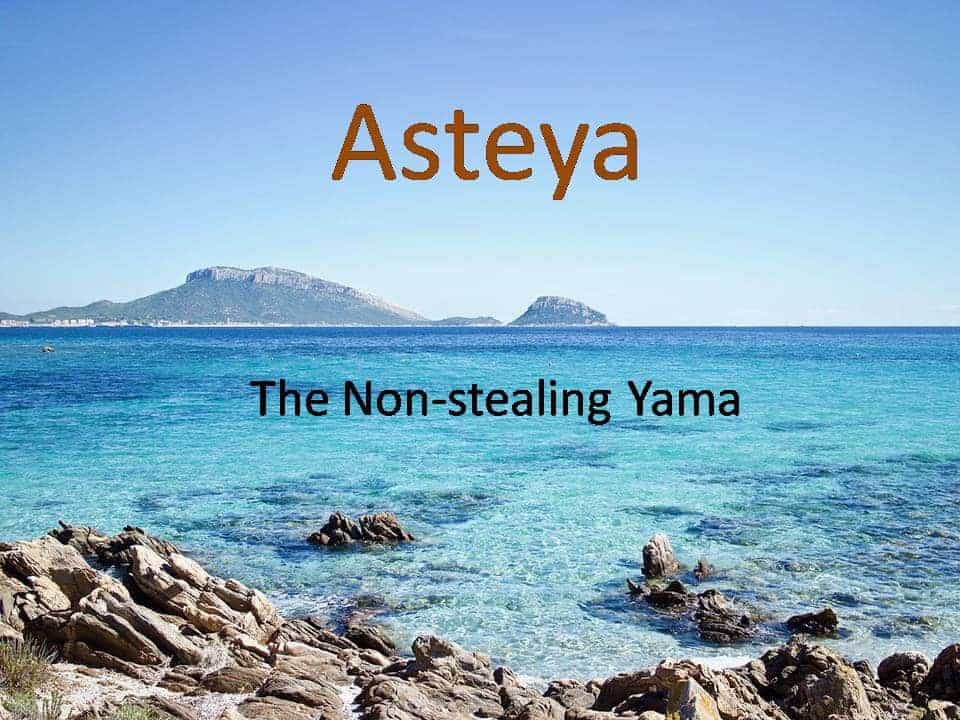Asteya Meaning
Asteya in Yoga Philosophy
Yoga Sutra verse 2.37 defines Asteya as “asteya-pratiṣṭhāyāṁ sarvaratn-opasthānam.” It means “when non-stealing is established in a yogi, all gems present themselves. He is provided with all wealth.”
The tendency of one’s Mind is not to be content with what one already has. On having got one thing, it craves for another. It is a never-ending phenomenon. This tendency of the mind always makes one want, whatever wealth he already has. Only the man who is content with what he already has is the wealthiest one because he wants nothing more. In him, there is no question of stealing. He has established the habit of non-stealing. Hence Patanjali says that the yogi who has established the habit of non-stealing is provided with all the wealth.
Stealing deprives others of their possessions. It hurts others and is against Ahimsa, the primary yama. Hence non-stealing is as important as Ahimsa and helps the yogi achieve his goals. Non-stealing is not confined to things alone. One should not steal others’ time, wife, name, fame, rights, and the like. Non-stealing is nothing but not acquiring illegitimate wealth. He should cultivate non-stealing in thoughts, words, and deeds.
Non-stealing in Hinduism
Asteya is a dharma or moral duty in Hinduism. According to Manusmriti Dharma is five-fold. They are Ahimsa (Non-violence), Satya (Truthfulness), Asteya (non-stealing), Shoucham (Purity), and Indiryanigraha (Control of sense organs).
Non-stealing is of utmost importance. The desire to earn wealth through illegitimate methods makes one a corrupt, deceitful, scandalous, bootlegger, gray marketer, exploiter and drives even the men of noble status to exploit the miseries of others to make wealth with utter disregard to professional and moral ethics.
Manusmriti 2.116 prohibits a person from acquiring without permission the Veda from one who recites it which is termed as stealing of Veda.
Manu classifies Chourya-bhava (avoidance of theft) under Sadharanadharma or generic duties applicable to all irrespective of their age, caste, or creed. These duties apply to a man as a man and not as a member of a particular community or social class or being at a particular stage of life.
Prasastapada (Indian philosopher of the 6th Century CE and author of Padārtha-dharma-saṅgraha and Praśastapāda Bhāṣya) includes Asteya in Samanyadharma classification which is equivalent to Sadharandharma of Manu.
According to Prasasapada, Asteya as a duty is not the mere abstinence of appropriation of things of value that belong to others but implies an internal resolve to disapprove and disdain all acts of misappropriation as unrighteous.
Evidently, from the moment of such a resolve, a subconscious modification of the person who has taken the resolve in the direction of righteousness goes on accumulating even when there is no conscious endeavor to improve oneself in the intervening time.
Chandogya Upanishad omits Asteya in its list of five-fold virtues. Arunikopanishad gives a four-fold list of dharma: Brahmacharya, Ahimsa, Aparigraha, and Satya. It does not include Asteya. Bhagavad Gita also gives a different list of dharma that does not include Asteya.
Non-stealing In Jainism
Asteya is one of the Pancha Mahavrata (five-fold major vows) to be observed by Jain ascetics.
According to Puruşārthasiddhyupāya of Acharya Amritachandra of the tenth century CE, taking anything that has not been given to is termed as theft and it causes himsa.
Verse 7.15 of Tattvarthsutra of Acharya Umasvami gives the same definition.
Verse 103 of Puruşārthasiddhyupāya states “All possessions of men are their external vitalities. Anyone who deprives them of their possessions destroys vitalities.”
Verse 104 states “There exists no exclusivity between theft and Ahimsa. Wherever there is theft, there is himsa too. The underlying cause of theft if passion.”
Verse 105 says, “Taking anything without passion is not himsa. Hence no himsa involved in taking karmic molecules by passionless ascetics.”
Verse 106 says, “Those who are not able to abstain from taking well-water (taken, but not being given to them) should always refrain from taking anything else that is not given to them.”
Tattvarthsutra prescribes the observances to strengthen the vow of non-stealing.
- Keep the residence in a lonely place
- Keep the residence in a secluded place in a deserted habitation
- Abstain from hurting others
- Accepting only clean food and
- No quarreling with fellow monks
Asteya in Buddhism
- Abstain from killing
- Abstain from stealing
- Abstain from sensual misconduct
- Abstain from lying
- Abstain from intoxicants
References
- F.Max Muller, The Sacred Books of the East, Vol XXV, Oxford Clarendon Press, 1886.
- Sushil Kumar Maitra, The Ethics of the Hindus, Calcutta University Press, 1925.
- J.N.Mohanty, Classical Indian Philosophy, Lowman & Littlefield Publishers, 2000.
- Vijay K.Jain, Puruşārthasiddhyupāya-Realization of the Pure Self, Vikalp Printers, 2012.

